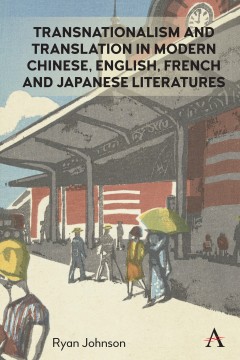Transnationalism and Translation in Modern Chinese, English, French and Japanese Literatures
By Ryan Johnson
Other Formats Available:
- About This Book
- Reviews
- Author Information
- Series
- Table of Contents
- Links
- Podcasts
About This Book
This book addresses several important questions in the fields of modern, comparative, and world literatures. At a time in which “weak theory” and transnationalism are becoming increasingly pressing topics, the volume considers the utility of philosophical logic, literary worlds, and analytic Asian Philosophy to understand world literature. In doing so, it investigates the ways in which Chinese, English, French, and Japanese writers eager to tackle the challenges of modernity gazed both across the Eurasian landmass and back in time to their own traditions.
Transnationalism and Translation in Modern Chinese, English French, and Japanese Literatures contends that world literature consists of many smaller literary worlds that are founded upon and made to conform with the deep-level ontological assumptions of their native tradition. The translation of texts across times and cultures introduces new logical possibilities to literary traditions and the writers who sustain them. Yet each translation also amounts to the creation of a new literary world, in which the ontological assumptions of the original are made to cohere according to the possibilities afforded by the culture into which the text is translated. This clash of ontologies, often overlooked in world literary studies, forms the basis of modern translational literature.
This book presents four comparative case studies. It begins with Ted Hughes’ and Chou-wen Chung’s attempt to make the Bardo Thödol express the desires of an expatriate American-Chinese composer and a rising English poet in the 1950s; passes by Paul Claudel’s and Mishima Yukio’s mid-century adaptations of medieval Nō theatre; looks at Claudel’s and Kuki Shūzō’s efforts to make the poetry of the Kokin Wakashū and premodern Japan accord with the experience of being an expatriate in 1920s Tokyo and Paris; and finishes with Hughes’ and Bei Dao’s endeavours to place themselves as heirs to the traditions of both China and Europe. It is these fortuitous but often ignored points of contact between East and West, ancient and modern, that exemplify the challenges and possibilities of transnationalism, allowing for an innovative new way of comprehending the multidirectional flow of world literature.
Reviews
“The fact of the unity and diversity of cultural worlds makes humanistic scholarship infinite. But deep differences impede understanding, maybe even sympathy. Ryan Johnson calls his way through this obstacle an intentional ‘vagueness’, a term too modest to reflect the careful analyses and brilliant conjectures that bring his choice of French, Chinese, Japanese and English works into a closer conversation.” — Haun Saussy, University Professor of Comparative Literature, University of Chicago
Ryan Johnson’'s _Transnationalism and Translation in Modern Chinese, English, French and Japanese Literatures_ is an important scholarly contribution to comparative literature, world literature and translation studies. It provides us with fascinating critiques of theoretical issues and exciting comparative analyses of individual works.” — Akitoshi Nagahata, Professor of English and American Literature, Nagoya University
“This bracing and illuminating study reanimates literary minds and worlds between East and West. Johnson’s conceptual nimbleness – from ontologies of vagueness to the force of weak theory – permits a fresh exploration of the intrigue of imprecision, moving through a remarkable set of collaborations and adaptations to comprehend the contradictions and boundaries of world literature.” — Josephine Nock-Hee Park, Professor of English and Asian American Studies, University of Pennsylvania
Johnson’s book undertakes a challenge of transforming the mostly sociological and quantitative concept of world literature into poetics, literary theory, and the methodology of reading by a surprising move: turning the concept’s very limitations, its vagueness and weakness, into an actual philosophical basis of aesthetic and epistemological inquiry. -- Olga V. Solovieva, Critical Inquiry (June 2021)
Author Information
Ryan Johnson is a tutor and research assistant in the Faculty of Arts and Sciences at the University of Sydney.
Series
Anthem Studies in Global English Literatures
Table of Contents
Acknowledgments; Introduction; PART 1 World Literature, Literary Worlds; Chapter One Literary Worlds and Degrees of Distance; PART 2 Dramatic Worlds; Chapter Two The Chou- Hughes Bardo Thödol and the Problem of Classification; Chapter Three What We Disagree about When We Disagree about Nō; PART 3 Poetic Worlds; Chapter Four Paul Claudel and Kuki Shūzō in the 1920s: France, Japan, and the World; Chapter Five Tradition East and West, English and Chinese: The Cross-Cultural Poetry of Bei Dao and Ted Hughes; Conclusion; Works Cited; Index.
Links
Stay Updated
Information
Latest Tweets



